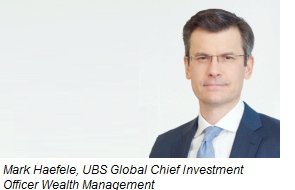
UBS: Is “poll” vaulting the right strategy for investors?
Investors had a tough time on 24 April… if they sat out the first round of France’s presidential election holding cash.
28.04.2017 | 09:38 Uhr
 The vast majority of growth-sensitive assets posted gains as centrist, pro-EU candidate Emmanuel Macron reaped the highest vote total among the four contenders, including second-place finisher and far-right anti-euro candidate Marine Le Pen.
The vast majority of growth-sensitive assets posted gains as centrist, pro-EU candidate Emmanuel Macron reaped the highest vote total among the four contenders, including second-place finisher and far-right anti-euro candidate Marine Le Pen.
Global equities also reached fresh highs.
Surveys suggest that a Le Pen win in the run-off would represent an election shock five to 10 times greater than the Brexit or Trump results. So, many investors have “vaulted” the polls, adding to their portfolio risk across regions and asset classes.
Is this the right strategy?
CIO has marked down its estimated probability of a Le Pen victory to 25% from 40%. But we don’t think her chances of becoming French president can be written off. She has already sought to position herself as the “anti-establishment” candidate. And a softening in her anti-euro stance could enable her to pivot toward a set of pro-employment policies that win over the voters of defeated far-left candidate Jean-Luc Mélenchon.
So how should global investors position their portfolios before the 7 May run-off?
1) Review and rebalance Eurozone asset holdings:
Eurozone economic and inflation data looks set to pick up in the second half of the year. While the same is true in the US, markets, in our view, have underappreciated how these trends should boost the euro against the US dollar. We advocate an overweight EUR versus underweight USD position for global investors.
Euro high yield credit still trades near all-time lows in yield terms. If France picks Macron, high yield is unlikely to outperform, though a Le Pen victory could push risky-bond spreads wider. These skewed risks favor an underweight to euro high yield credit in global portfolios.
Eurozone stocks have extended their rally this year to 10% in the wake of France’s first vote. With analyst earnings upgrades exceeding downgrades for the first time in seven years, fundamentals warrant some optimism. But the risk that a Le Pen win weighs on French stocks and stokes price turbulence suggests a large position in Eurozone equities may be premature. We prefer investing in them via an overweight to global equities in our tactical asset allocation.
2) Favor stocks over bonds in emerging markets (EM):
Investors whose asset class choices are confined to developing markets should overweight equities against USD-denominated corporate bonds. Our EM specialists recently added to stocks over bonds in local asset allocations. Better investor risk appetite has increased the appeal of assets most geared in to the global economic cycle. And EM equities can benefit from strengthening industrial sentiment at home – the GDP-weighted purchasing managers’ index for EM rose for a fourth straight month in March.
Trailing earnings per share are now up 8% this year, and we recently raised our estimate for next 12-month profit growth to 6–10%. Investors in a global portfolio with an overweight to world equities are implicitly tilted to developing nation stocks too, and should benefit from the region’s brighter prospects.
3) Revisit gold allocations:
After an 11% rally this year, gold prices could consolidate over the next three months, in our estimate. We anticipate fewer political risks in Europe and the Korean peninsula reducing investor appetite for perceived safe havens. And we think markets may be underestimating the likelihood that the US Federal Reserve hikes rates twice more this year per our expectations – higher real rates increase the opportunity cost of holding gold and reduce its allure. We have marked down our three and 12-month forecasts for the yellow metal to USD 1,200/oz and USD 1,250 respectively (from USD 1,300/oz).
Der komplette Marktkommentar als PDF-Dokument.



Diesen Beitrag teilen: